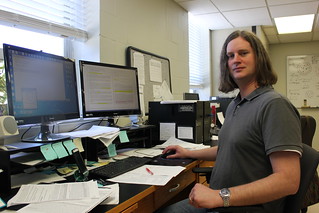Auburn veterinary medicine doctoral student invited to prestigious workshop on aging
Article body
Brett Augsburger, a doctoral student in the College of Veterinary Medicine, is the only graduate student in the country invited to attend a National Science Foundation workshop May 7-8 in Fairfax, Virginia.
Originally from Huntsville, Alabama, Augsburger was personally invited to the prestigious event by Leonard Hayflick, considered internationally as an authority on the science of organismal aging. Augsburger had sent his manuscript, "Rate of Aging is Determined by an Organism's Overall Entropy Management Strategy," to Hayflick in hopes of getting some constructive feedback.
Augsburger said he wanted "to see if he (Hayflick) would be interested in my theory. I didn't expect him to respond as quickly as he did, and in the manner in which he did."
Hayflick was sufficiently impressed with Augsburger's work and asked workshop organizers to extend him an invitation. The workshop will bring together about 25 diverse, internationally recognized scientists representing physics, materials science, information science and biology to brainstorm about the principles and processes underlying aging.
Augsburger, whose undergraduate degree from Auburn is in mechanical engineering, became interested in aging theory after recognizing the wildly divergent theories and lack of consensus in the field. His views on aging are similar to Hayflick's, viewing it as a multidisciplinary problem.
"My manuscript attempted to complete an area of Hayflick's theory that he had not yet discussed," he said.
Augsburger works in the research laboratory of Michael Irwin, a professor in the College of Veterinary Medicine's Department of Pathobiology.
"It's very unusual for a graduate student in this field to write a theory paper, but Brett is not your typical graduate student," Irwin said.
Augsburger's research is concerned with our susceptibility to disease as we age, specifically the dynamics that cause humans to be more susceptible to diseases the longer they live.
"The approach I'm looking at is how we prevent the increased susceptibility from occurring in the first place," he said. "I'm not looking at any specific disease, but rather the root causes of aging."
Related Media
Related Links
Media interested in this story can contact Communications Director Preston Sparks at (334) 844-9999 or preston.sparks@auburn.edu.
Auburn University is a nationally ranked land grant institution recognized for its commitment to world-class scholarship, interdisciplinary research with an elite, top-tier Carnegie R1 classification, life-changing outreach with Carnegie’s Community Engagement designation and an undergraduate education experience second to none. Auburn is home to more than 30,000 students, and its faculty and research partners collaborate to develop and deliver meaningful scholarship, science and technology-based advancements that meet pressing regional, national and global needs. Auburn’s commitment to active student engagement, professional success and public/private partnership drives a growing reputation for outreach and extension that delivers broad economic, health and societal impact.





